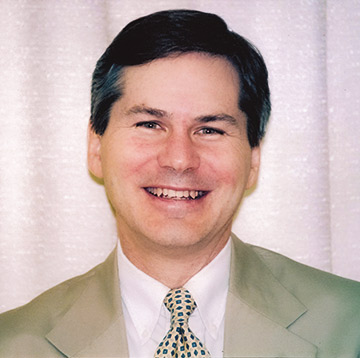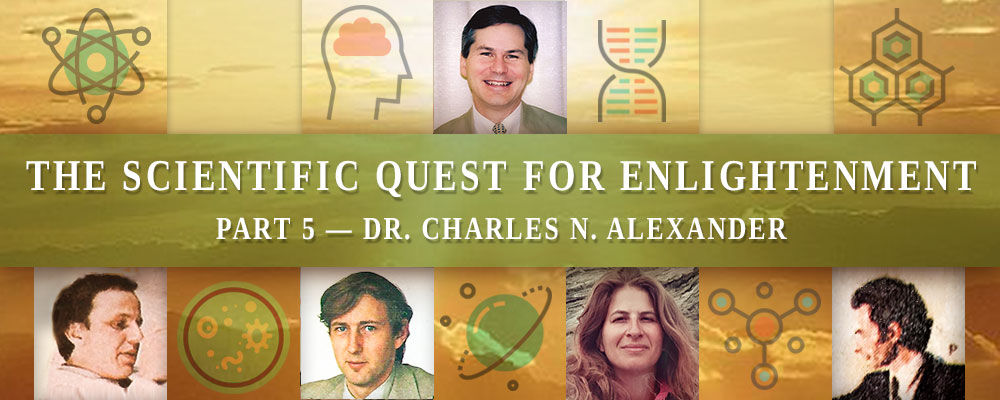Editor’s note: See Part 5 of Dr. David Orme-Johnson’s Scientific Quest for Enlightenment Series, “Landmark Study on Neurophysiological Evidence of Cosmic Consciousness,” to learn more about Dr. Charles Alexander and his work.
Harvard-trained experimental psychologist Dr. Charles N. Alexander was one of the most brilliant, accomplished, published, and beloved faculty of the Psychology Department at Maharishi International University. Dr. Alexander, who was fondly called “Skip” by his family, friends, and colleagues, was internationally known in the field of developmental psychology. His theoretical work showed that the seven states of consciousness described by TM Founder Maharishi Mahesh Yogi in Maharishi Vedic ScienceSM are the logical extension of the developmental sequence described by various prominent psychologists in the field, such as Jean Piaget, Lawrence Kohlberg, Erik Erikson, and Jane Loevinger.1-3

Charles N. “Skip” Alexander, Ph.D.
Dr. Alexander reasoned that since the trajectory of human psychological development is to unfold increasingly comprehensive levels of awareness and intelligence at deeper levels of the mind, the development of the deepest level of the mind, Transcendental Consciousness, was the next logical step to propel human development to higher levels. He recognized the sequential unfolding of stages of enlightenment, the seven states of consciousness described by Maharishi, as the logical extension of this natural growth. Dr. Alexander’s work systematically extends the understanding of the highest reaches of human development far beyond what developmental psychology had previously thought possible.
He maintained that humanity was developmentally frozen in an immature state because of the lack of an effective technology to enliven the transcendental level of the mind. Based on his study of Maharishi’s exposition of the principles of human growth and development, Dr. Alexander posited that this lack is the fundamental reason that for millennia people have universally made mistakes and suffered, unable to live the life of fully mature, “enlightened” individuals.1-3
Dr. Alexander’s work systematically extends the understanding of the highest reaches of human development far beyond what developmental psychology had previously thought possible.
Landmark Studies
Dr. Alexander designed some of the best research on the effects of the TM and TM-Sidhi® programs, including landmark studies demonstrating that the TM technique provides the missing developmental technology to access the transcendent, the deepest level of the mind,4 thus providing an effective means to nurture and accelerate child development;5 to reduce stress in adults;6 to reduce drug and alcohol abuse;7 to treat hypertension;8-11 to improve employee effectiveness and the quality of life in business;12 to increase self-actualization;13 to truly rehabilitate felons and reduce their return rate to prison;14-18 and to provide a higher quality of life, health, and cognitive clarity in the elderly and reduce their mortality rates.19,20
Dr. Alexander also led his graduate students to study the effects of the group practice of the TM and TM-Sidhi programs on increasing the quality of life in society, reducing armed conflicts on national and international levels, replacing conflict with peace and cooperation,21-24 and providing a realistic, evidence-based path to world peace.21
He and his doctoral student Lynne Israelson Mason, Ph.D., conducted the first physiological study of people having experiences of Cosmic Consciousness, demonstrating the reality of higher states of consciousness according to Maharishi Vedic Science. See “Landmark Study on Neurophysiological Evidence of Cosmic Consciousness” to learn more about this research.
Dr. Alexander designed some of the best research on the effects of the TM and TM-Sidhi programs, including landmark studies demonstrating that the TM technique provides the missing developmental technology to access the transcendent, the deepest level of the mind.
Notes
1. C. N. Alexander, Druker S. M., Langer E. J. “Major issues in the exploration of adult growth.” In Higher Stages of Human Development: Perspectives on Adult Growth, edited by Alexander C. N., Langer E. J., 3-32. New York: Oxford University Press, 1990.
2. C. N. Alexander, Davies J. L., Dixon C. A., et al. “Growth of Higher Stages of Consciousness: Maharishi’s Vedic Psychology of Human Development.” In Higher Stages of Human Development: Perspectives on Adult Growth, edited by Alexander CN, Langer EL, 268-341. New York: Oxford University Press, 1990.
3. D. W. Orme-Johnson. “Charles N. (Skip) Alexander’s contribution to psychology.” Journal of Adult Development 7, no. 4 (2000): 199 – 215.
4. C. N. Alexander, Boyer R. W. “Seven States of Consciousness: Unfolding the Full Potential of the Cosmic Psyche in Individual Life through Maharishi’s Vedic Psychology.” Modern Science and Vedic Science 2, no. 4 (1989): 325-371.
5. C. N. Alexander, Kurth S. C., Travis F., Alexander V. K. “Effect of practice of Maharishi Word of Wisdom Technique on children’s cognitive stage development: Acquisition and consolidation of conservation.” Journal of Social Behavior and Personality 1 (2005): 21-46.
6. C. N. Alexander, Robinson P., Orme-Johnson D. W., et al. “The effects of Transcendental Meditation compared to other methods of relaxation and meditation in reducing risk factors, morbidity, and mortality.” Homeostasis 35, no. 4-5 (1995): 243-264.
7. C. N. Alexander, Robinson P., Rainforth M. V. “Treating and preventing alcohol, nicotine and drug abuse through the Transcendental Meditation technique: A review and statistical analysis.” In Self Recovery—Treating Addictions Using Transcendental Meditation and Maharishi Ayur-Veda, edited by O’Connell DF, Alexander CN, pp.13-88. Binghamton, NY: Harrington Park Press, 1994.
8. C. N. Alexander, Schneider R. H., Staggers F., et al. “A trial of stress reduction for hypertension in older African Americans (Part II): Sex and risk factor subgroup analysis.” Hypertension 28, no. 1 (1996): 228-237.
9. R. H. Schneider, Alexander C. N., Wallace R. K. “In search of an optimal behavioral treatment for hypertension: A review and focus on Transcendental Meditation.” In Personality, Elevated Blood Pressure, and Essential Hypertension, edited by Johnson E. H., Gentry W. D., Julius S., 291-312. Washington DC: Hemisphere Publishing Corporation, 1992.
10. R. Schneider, Alexander C., Orme-Johnson D., et al. “A controlled trial of effects of stress reduction on left ventricular mass in hypertensive African Americans.” Ethnicity and Disease 14, no. Autumn (2004): S2-54.
11. C. N. Alexander, Schneider R. H., Clayborne M. “Stress Reduction in hypertensive elderly African-American Men and Women: Comparison of Transcendental Meditation and Progressive Muscle Relaxation.” American Journal of Hypertension (1995).
12. C. N. Alexander, Swanson G. C., Rainforth M. V., et al. “Effects of the Transcendental Meditation program on stress reduction, health, and employee development: A prospective study in two occupational settings.” Anxiety, Stress and Coping: An International Journal 6 (1993): 245-262.
13. C. N. Alexander, Rainforth M. V., Gelderloos P. “Transcendental Meditation, Self-Actualization and Psychological Health: A Conceptual Overview and Statistical Meta-Analysis.” Journal of Social Behavior and Personality 6, no. 5 (1991): 189-247.
14. C. N. Alexander. “Ego development, personality and behavioral changes in inmates practicing the Transcendental Meditation technique or participating in other programs: A cross-sectional and longitudinal study.” Dissertation Abstracts International 43 (1982): 539B.
15. C. N. Alexander, Orme-Johnson D. W. “Walpole study of the TM program in maximum security prisoners II: Longitudinal study of development and psychopathology.” Journal of Offender Rehabilitation 36, no. 1-4 (2003): 127-160.
16. C. N. Alexander, Rainforth M. V., Frank P. R., et al. “Walpole study of the Transcendental Meditation program in maximum security prisoners III: Reduced recidivism.” Journal of Offender Rehabilitation 36, no. 3 (2003): 161-180.
17. C. N. Alexander, Walton K. G., Orme-Johnson D. W., Goodman R. S. “Transcendental Meditation in Criminal Rehabilitation and Crime Prevention.” Journal of Offender Rehabilitation 36, no. 1/2/3/4 (2003): 1-383.
18. C. N. Alexander, Walton K. G., Goodman R. S. “Walpole study of the TM program in maximum security prisoners I: Cross-sectional differences in development and psychopathology.” Journal of Offender Rehabilitation 36, no. 1 (2003): 97-125.
19. C. N. Alexander, Barnes V. A., Schneider R. H., et al. “A randomized controlled trial of stress reduction on cardiovascular and all-cause mortality in the elderly: Results of 8 and 15 year follow-ups.” Circulation 93, no. 3 (1996): P19.
20. C. N. Alexander, Langer E. J., Newman R. I., et al. “Transcendental Meditation, mindfulness, and longevity: an experimental study with the elderly.” Journal of Personality and Social Psychology 57, no. 6 (1989): 950-964.
21. C. N. Alexander. “Peaceful Body, Peaceful Mind, Peaceful World.” Modern Science Vedic Science 5, no. 1-2 (1992): 150-163.
22. D. W. Orme-Johnson, Dillbeck M. C., Alexander C. N. “Preventing terrorism and international conflict: Effects of large assemblies of participants in the Transcendental Meditation and TM-Sidhi programs.” Journal of Offender Rehabilitation 36 (2003): 283-302.
23. D. W. Orme-Johnson, Alexander C. N., Davies J. L. “The effects of the Maharishi Technology of the Unified Field: Reply to a methodological critique.” Journal of Conflict Resolution 34 (1990): 756–768.
24. J. L. Davies, Alexander C. N. “Alleviating political violence through reducing collective tension: Impact assessment analysis of the Lebanon war.” Journal of Social Behavior and Personality 17, no. 1 (2005): 285-338.
Post Views: 1,796



Comments
you may also like
Science & Research
Landmark Study on Neurophysiological Evidence of Cosmic Consciousness
Renowned TM researcher David Orme-Johnson, Ph.D., interviews Lynne Mason, Ph.D., about her groundbreaking sleep research on TM practitioners who experience “witnessing” (inner awareness) during deep sleep, a signature phenomenon of Cosmic Consciousness.
Enlightenment Series
The Remarkable Story of the Scientific Exploration of Enlightenment | 5:06
In 1970, a revolutionary quest began—to create a scientific portrait of the TM technique and Transcendental Consciousness. Renowned TM researcher Dr. David Orme-Johnson takes us behind the scenes in part 2 of his popular series.
Science & Research
How Transcending Optimizes Your Brain
What happens to our brains when we transcend? Do we experience a new state of consciousness? How does that help us realize our highest potential? In part 3 of his popular series, Dr. David Orme-Johnson tells the story of the revolutionary TM research that advanced the science of human potential.
Science & Research
What Is Cosmic Consciousness?
From “peak experiences” to normalization of the nervous system, renowned TM researcher David Orme-Johnson, Ph.D., explains the nuts and bolts of enlightenment, the ultimate development of human potential—plus the ground-breaking research discovering the neurophysiological evidence for Cosmic Consciousness.